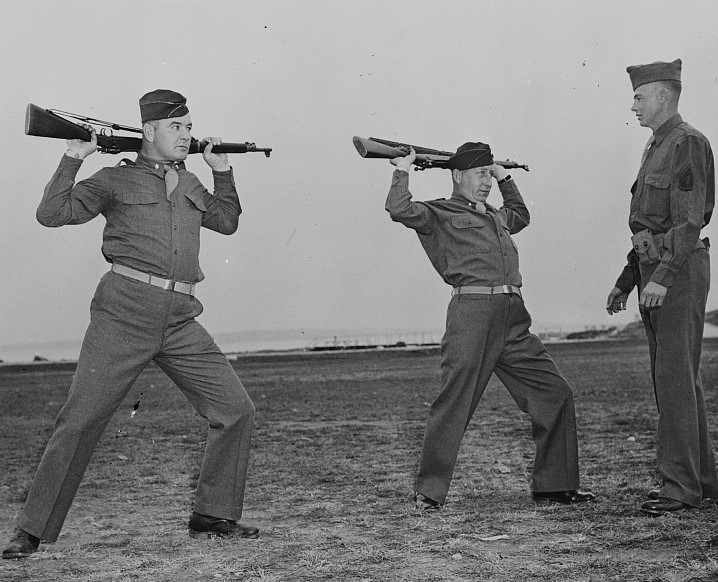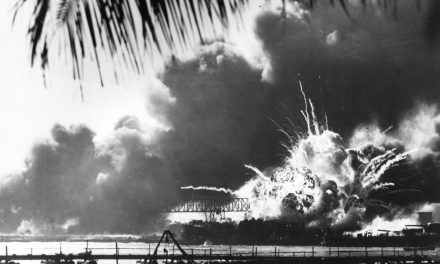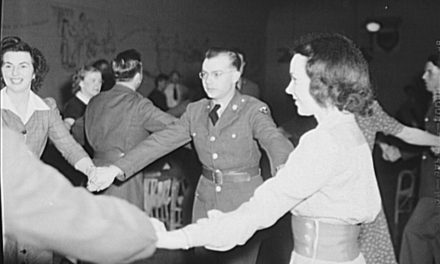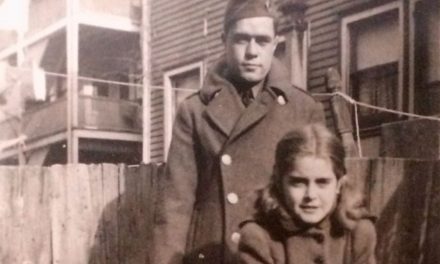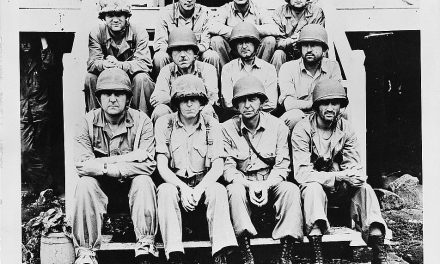Growing up the oldest child in a middle-class home in Newark, Walter Berger loved sports but never thought he would become one of the Army’s most well-trained men in New Jersey.
Although always athletic, it was in middle school that his greatest talent came to light: tennis. He initially attended the high school down the road; however, it only took a few months before he was recruited by neighboring West Side High School. During his time at West Side, Walter went on an 18-match winning streak; he anticipated that he would continue his tennis career throughout college.
Berger was recruited and attended Rutgers. However, even with playing tennis, there was little money during the height of the Depression, and like many others, he could not afford to continue school. He joined ROTC for two years, getting a full scholarship to help him pay for his university education, and getting his foot in the Army’s door. He explained, “I would have taken more ROTC but I got a job with Westinghouse for the summer, so I earned money.” He thought that those two years would be all the time he would ever spend in the Army, but sometimes the world has other plans.
When Pearl Harbor was bombed in December 1941, the draft was called and Walter Berger knew he was going to be an Army man again. “I kept watching. My number was never even approached, but I felt obligated to get in it,” Berger explained. So after months of waiting, his Army instincts kicked in and in the spring of 1942 he enlisted at Fort Monmouth, New Jersey. With his father in Ohio making instruments for the Signal Corps and U.S. Army Air Force, he knew that one day he wanted to be a part of the Signal Corps—to be one of the men his father was helping.
So that Friday afternoon he took his physical at the Newark Armory, passed, packed a small satchel and got on the train to Little Silver, New Jersey, a training base for new enlistees. A seemly normal experience went awry when Walter Berger arrived on location there was nobody there. It wasn’t until he walked around the building that he found a sergeant on duty. The sergeant explained that they were not supposed to have enlistees arrive late on Fridays. So he and the sergeant got in a jeep and headed up to Camp Edison. Even there, where the enlistees were supposed to be, nothing was prepared for him. Berger described feeling “scared to death” and felt that “nobody knew what to do with me.”
So after sleeping on a cot in civilian clothes for three nights, Berger was finally given his uniforms and was put into basic training. “I think it was six weeks of basic training. Then, I thought I would be smart,” he said. He was unaware that these six weeks of training, under the watchful eye of his supervisor, wouldn’t be the last training he would receive. He described his captain at this time as “not your regular Army officer.” A university professor by trade, Captain Little had been called back to service during the draft. Captain Little assigned Berger to be the company clerk, which sent him to clerk school for a few weeks, adding to his Army educational resume.
After clerk training, Berger was assigned to a Signal Corp at Fort Monmouth, New Jersey, and a few weeks later the shipping-out list was posted. Nobody knew exactly where they were going, but everyone expected to be relocated. Thinking back on that day, he described how “They had posted everyone’s names on the board with where they were being relocated. But when I checked, my name wasn’t on the board. I couldn’t help but wonder what I had done wrong!”
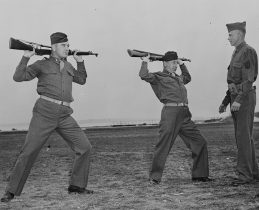
Two U.S. Army recruits perform rifle calisthenics under instruction from Sergeant John A. Bender at Fort Slocum, New York.
At this point Berger’s superiors informed him that he had never had an IQ test, so before he could go anywhere he was required to report to Fort Monmouth Headquarters for intelligence testing. “In the condition I was in, I was sure I was going to end up collecting garbage,” he said.
However, things were better than Berger could have ever imagined. “They called me in,” Berger recalled. “[An officer] said ‘You know you got a 130. Now we’re in real trouble because people with 130 and over, two years of some training, they’re looking for officers. You’re going down before the officer’s board this morning.’”
And just like that, Walter Berger’s life was changed from an Army boy in the Signal Corp to a future Army Officer. Berger was informed that he would be sent to Officers Training School.
Berger described that year of his life as tough physical and mental work. Being one of the lower-ranked men, only a private first class, there were a lot of older sergeants who clearly had an advantage. The Officers Training School, or Prep School as it was known, had a reputation for telling students at the last minute that they had to leave and would not graduate.
This happened during his time when one young man came back to his barrack the night before graduation and found a note telling him that he would not be graduating with his class. Berger was one of the lucky ones to graduate. He was assigned to Fort Monmouth where he furthered his education at Officers Supply School.
So Walter Berger, with lots of education behind him, continues on another journey to becoming Captain. This 26–year-old Lieutenant, who once had dreams of being a tennis star, will be well-prepared to fight for freedom instead.
Source: Rutgers Oral History Archive, interview conducted by G. Kurt Piehler and Kathleen Jones on September 13, 1995. http://oralhistory.rutgers.edu/interviewees/800-berger-walter-h

